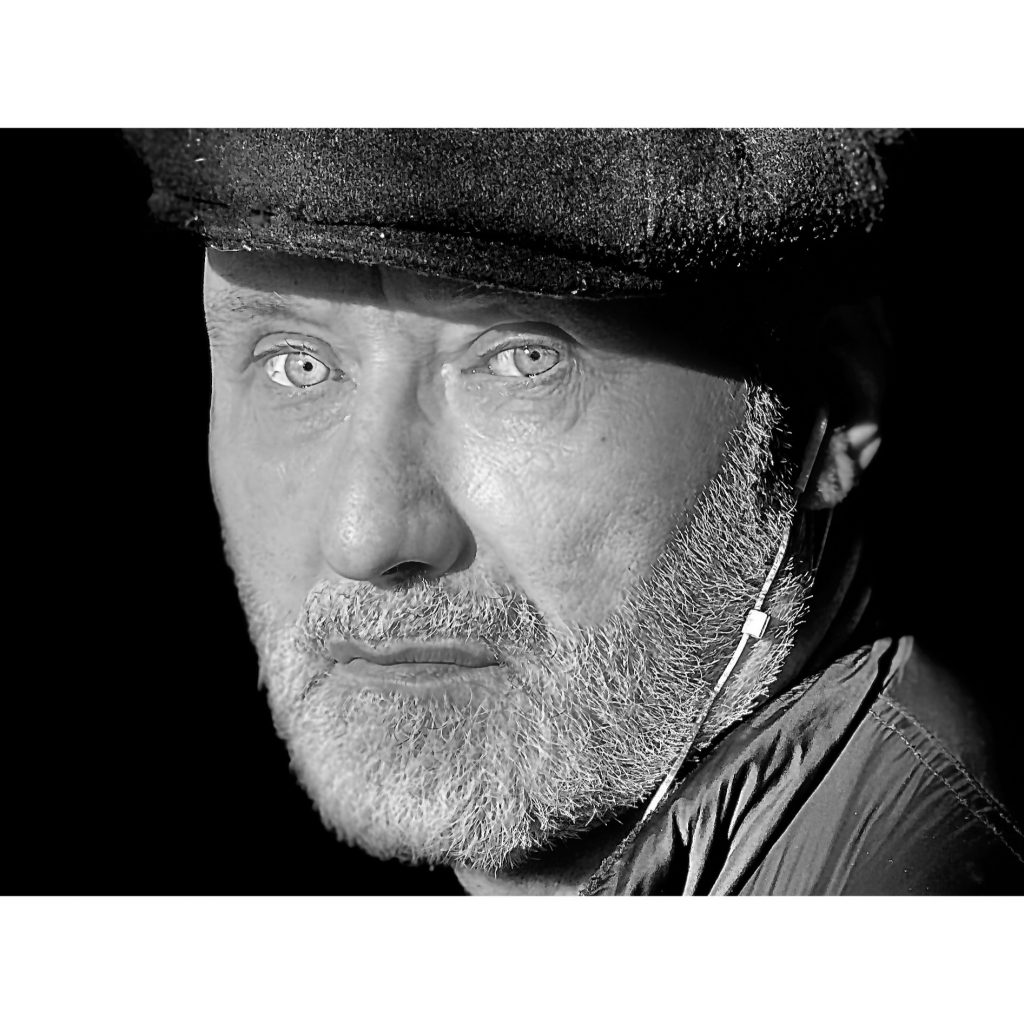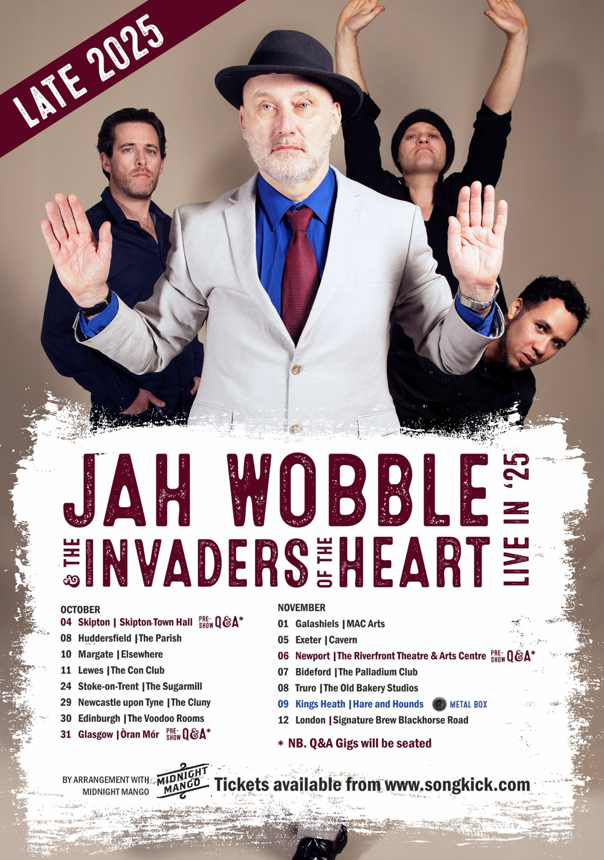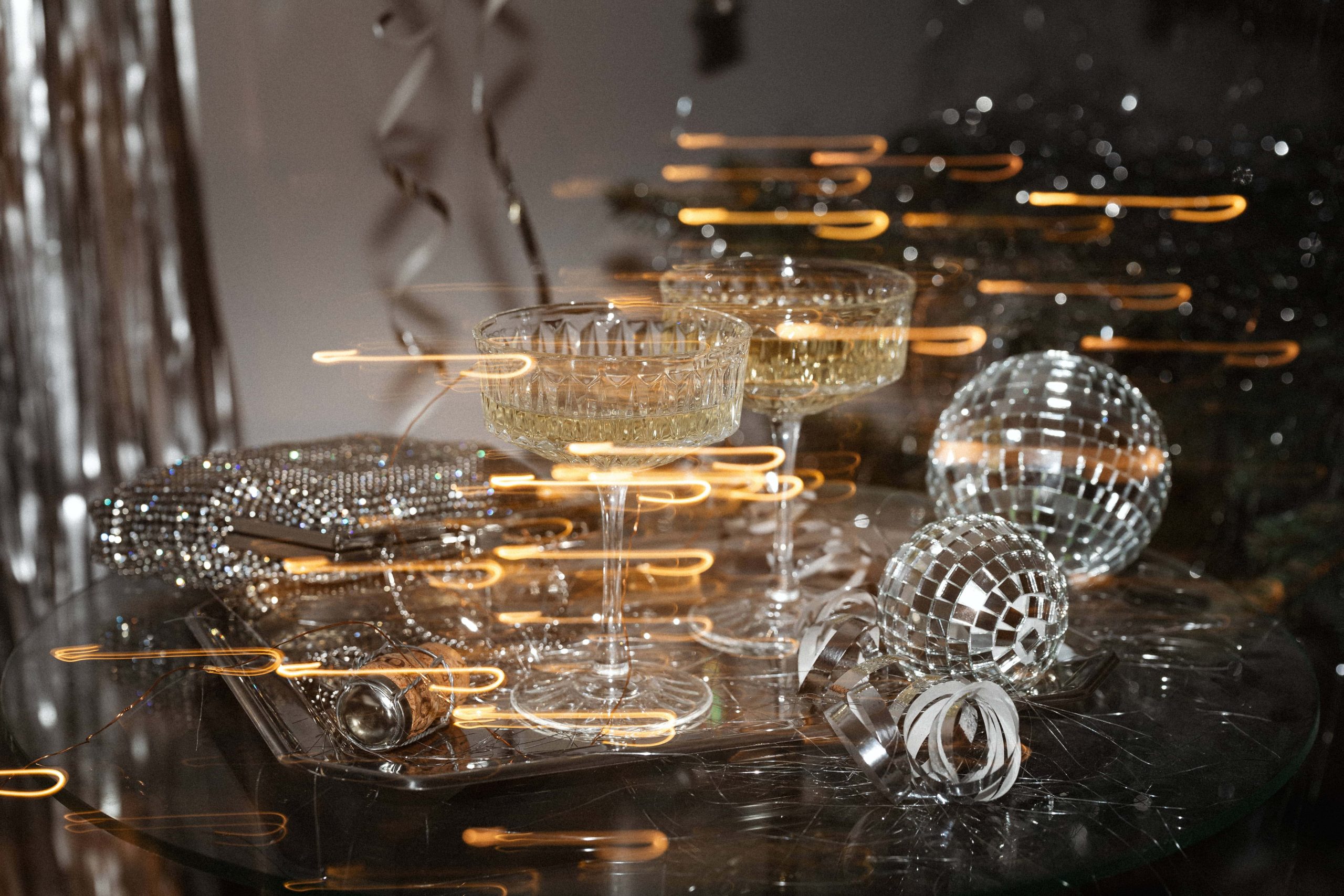Few basslines are as instantly recognisable as those played by Jah Wobble. From the man who famously got his stage name from a drunk Sid Vicious, and bursting out of London’s late-’70s punk explosion with Public Image Ltd, John (his real name) helped to shape the sabre toothed and iconic post-punk sound that would go on to influence generations.
However, his career didn’t stop there. With his band ‘The Invaders of the Heart’, who have been alive and kicking since 1982, Wobble has spent decades fusing dub, jazz, world music and spoken-word poetry into something uniquely his own and creating a sound that’s as meditative as it is danceable.
Now, in 2025, Jah Wobble & The Invaders of the Heart are back on the road, touring across the UK with a setlist that promises both nostalgia and invention. I caught up with John (aka Jah Wobble) to talk about what fans can expect from the tour, his musical inspirations, and the journey from the East End of London to ambient collaborations with Brian Eno.

On the New Tour
What can we expect from this tour? (Without giving too much away), will it be a similar setlist to past ‘Invaders of the Heart’ tours, in which you play some of the first PiL album and Metal Box. Or will we be seeing more dub reggae and spoken word poetry that is on your solo albums?
John: The unexpected sometimes, it’s an “Invaders of the Heart” gig so we’ll do some old PiL numbers, probably Public Image or Poptones I love that track, so we do our own version of it obviously. We’ll be doing some dub and some reggae, it’s important that it shows entertainment while also some surprises and getting quite trancey – we still improvise a fair bit in some segments which really works well because everyone’s in the moment. So, it’s nice to balance it with improv as well as stuff people are familiar with, we get quite a few young people there so hopefully it catches the odd ‘floating boater’.
Fusing Worlds: From Post-Punk to Mongolian Folk.
Your solo work fuses together many different styles and genres – the post punk and Chinese/Mongolian influences on your solo album ‘songs for workers’ are really interesting. Are you planning to pursue this fusion with the invaders of the heart? Or are you happy to play the old songs?
John: That tends to be if my sons are with me that I’ll play ‘songs for workers stuff’. If it turns out that i’ve got a gig and it’s a weekend and they fancy it, they’ll jump in a car and play as well they get on with the band and sit in and do a set with the more Chinese/Mongolian kind of stuff.
Inspiration and New Sounds
You’ve been in the game for a while, are there any new exciting bands or genres that keep you creatively tuned in? When you started in the 70s. Obviously so much was going on at that time in London with the punk scene and The Sex Pistols etc. There doesn’t seem to be as much of a scene like that as much anymore now so do you draw inspiration from that era, or are there any new bands or genres you enjoy?
John: My sons turn me on to stuff, I’ve turned them onto a lot of old school stuff over the years, and they’ve turned me on to a lot of American Jazz players who are very good, hardcore Siberian music and stuff from Mongolia – they seem to really like the heavy metal stuff. Apart from that I’m quite sad! I listen to a lot of ambient stuff offstage, not so much group stuff offstage. I listen to Ambient essentials on Apple music – which is a bit pathetic I know!
On Working with Brian Eno
Leading on from that, what was it like working with Brian Eno on the album Spinner in the mid-90s? Were you into ambient stuff then and was he an artist you had been interested in before?
John: I met Brian, and he asked me if I wanted to do something, so I played on a track on one of his albums at Abbey Road. He said “here’s some little sketches off stuff i’ve done for a Derek Jarman film”, I think it was ‘Jubilee’ and it was literally 4-5 second pieces of piano music and stuff and it was frustrating because I just wanted to make an album.
We started to make the album in my studio, and a lot of the inspiration came from just walking around – at the time I was still living in East London and I was walking up the River Lea a lot and just got this real surreal, strange groove from it, it was a semi-rural post-industrial landscape. Anyway, we did the album and I felt it was a nice mixture of ambient and kind of rhythm – almost like dance music, and I think it turned out to be quite sort of groundbreaking.
But it sold really well over the years, and I hadn’t listened to it for a couple of years until I did and thought “wow this is really good.” It’s got a lot of simple stuff in there. Brian was worried about ‘affected drum kits’, which was considered really bad form at the time, certainly in the Rock idiom. But I was doing EQ sweeps across the drums, making effects on effects. What you hear on that album is a precursor to a lot of dance music.
Finding Poetry in North London
The album ‘North London Line (Mildmay) is an interesting concept to me, with the spoken word poetry it has a John Cooper Clarke feel to it, it’s almost a love letter to that area of North to West London. Where did this idea come from what drew you to writing about that and how did you come up with it?
John: Well, I’m used to North London over the years, I call it the old North London Line because the old line runs all the way to North Woolwich. It was all very surreal. There were tangles of weeds on the tracks even when it was in use. I used it and still do. After doing the Bus Routes album, which was done by sitting on buses with my iPad, I figured I’d just do the same with the old North London line.
I hadn’t really thought it through because I just used to sit on the trains and write the music in segments, but I found that it wasn’t working so instead I sat at the stations and did it. Then I started to get a sense of place much more than the Bus Routes album. It started to remind me of William Blake stuff I’ve done in the past. Places like Hackney and Islington are areas I know really well so that sense of place comes into form and some of it takes its form and style from Kenneth Williams. Camden has a very special vibe; it paints some impressionistic sort of pictures as well.
On the Roots of East London and Beyond
Another track on dub ‘Old Jewish East End of London’, did you hear a lot of Hebrew and Jewish music growing up in the East end which led you to put it on your album, or is that something you’ve discovered later in life?
John: I discovered the music probably a bit later, the vibe around there. I used to watch all the old Jewish guys push their carts around and everything. Where I lived in Stepney Way, it was so strong the smell (I love all that food) you really had an overtone of the Jewish setting. We had Jewish neighbours, I had a super affinity to Tottenham, and I think that has something to do with a connection to Jews. The track is just very much just imagining that era and that time of walking around east London.
Managing Yourself in the Music Industry
What’s the experience like of managing yourself? It sounds like an ideal situation where there isn’t someone telling you what to do, however they do say the grass is always greener?
John: Oh, it can be a pain of course and as you get older it’s hard to keep up with everything. I find that with a label now it seems like so much effort to do all the logistics so it would be great to leave it to a label but generally, it’s fantastic and it’s a great time to manage yourself!
Half the time and reason that you did need a manager is because communications were rubbish. You didn’t have a mobile phone, you’d be in the studio unable to take a phone call, someone’s got to do it for you. A lot of the time that didn’t need a manager, a lot of people would have been better off having an assistant. I think there were a lot of double dealings in the music business, there was a lot of conflict of interest and unregulated.
One of the reasons I haven’t got a manager is because of Public Image. The business was done terribly, badly organised. But Metal Box, if we’d had had a manger, it would have never happened. A lot of people at the time thought it was madness, and it was just noise, but Richard Branson just said, ‘let them do it’. So, because there wasn’t a manager we were able to go forward and make this terrifically weird left field self-indulgent record full of angst.
When I left PiL I learnt a lot about managing, but I was fiercely independent and very cynical about managers, but I learnt to make the maximum from the minimum. The business as it was now has gone, so we’re in a new model and everyone is on Bandcamp, so you have to maximise with a wing and a prayer, keep plugging away, believing in what you believe and think like an artist.
What’s next for The Invaders of the Heart?
You did a couple of shows earlier this year as Jah Wobble and the Invaders of the Heart. Can we expect anything new on the horizon in terms of albums?
John: Yes, there’s a re-release of The Usual Suspects which is coming out on Dimple Disc and we have a new album with Dimple Disc which is actually stuff we’ve done – we did this sort of pledge album and made some really left-field stuff that we’ve just been sitting on so I think that’s coming out as well. I’m really glad! It’s the same cover and everything (so it’s easy to recognise!).

As The Invaders of the Heart head out on tour, Wobble’s mix of humour, humility and restless creativity shines through. Expect a set that journeys from post-punk to deep dub, to ambient electronica.
Catch Jah Wobble & The Invaders of the Heart on tour this Autumn. If you can’t? A gig review of their Newport show will be coming your way soon!
Words by Mia Samson


